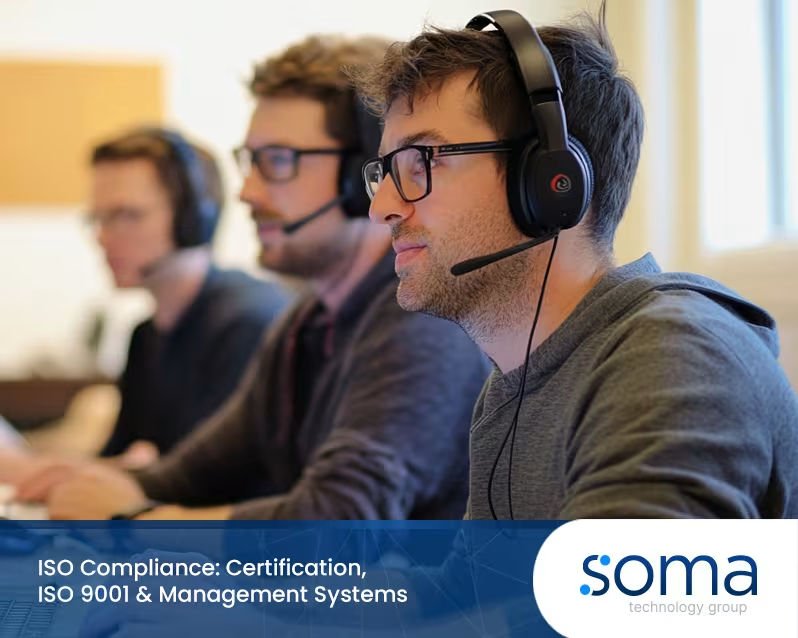
Risk Advisory: 6 Questions To Ask When Looking for an IT Risk Consultant
Every time a business adds new tech—whether it’s cloud tools, smart devices, or new software—it opens the door to new risks. These days, it’s not just about broken systems or outdated hardware. Cyber threats are growing fast.
In fact, a studyfound that attacks targeting smart devices (IoT malware) have jumped by 400%, with manufacturing companies getting hit the most.
That’s where IT risk consultants come in. Their job is to help businesses spot problems before they happen, protect systems from cyber threats, and make sure everything stays in line with rules and regulations.
This blog breaks down what IT risk management means, what IT risk consultants actually do, and why their work is becoming more important for businesses that rely on technology to grow.

What is IT risk management?
IT risk management refers to the process of identifying, assessing, mitigating, and monitoring risks related to the use of information technology within an organisation.
These risks may arise from cybersecurity threats, outdated systems, internal vulnerabilities, or even the implementation of new technologies such as cloud computing and ERP platforms.
Effective IT risk management frameworks help organisations build trust, ensure business continuity, and meet a broad range of compliance and governance requirements. An IT security risk assessment helps pinpoint gaps in your system before threats can exploit them.
In regions like Australia, this is particularly crucial, given the strict requirements from bodies such as APRA and the increasing complexity of risk faced by financial services firms.
Risk professionals use assessment tools to help clients make smarter decisions, anticipate new risks, and support transformation programs that deliver real business performance improvements.
What does an IT risk consultant do?
Looking to break into IT risk consulting or hire someone who truly understands the field? These are the key skills and traits that set successful IT risk consultants apart.
Assess technology risks in digital environments
An IT risk consultant identifies technology risks that may impact systems, data, and business operations.
This includes evaluating enterprise software platforms like ERP systems, reviewing cloud computing strategies, and conducting information systems audits to find gaps in security or performance.
These assessments help organisations manage risk while still enabling growth and transformation. This kind of risk management in IT projects helps keep innovation safe and structured.
Support governance, risk, and compliance (GRC) frameworks
Governance isn’t just about policies—it’s about embedding accountability into every level of the organisation.
IT risk consultants help build and maintain governance structures that align with international standards, industry-specific regulations, and stakeholder expectations.
Their advisory services help ensure that IT risk management isn’t siloed, but integrated across departments to support agile decision-making and compliance.
Mitigate cybersecurity threats and system vulnerabilities
From ransomware to phishing attacks, cyber threats are now a daily reality. Risk consulting professionals assess exposure to cyberattacks and recommend controls that prevent breaches and data loss. This includes performing an IT security risk assessment as part of their early-stage evaluation.
By leveraging cybersecurity frameworks and SOC (System and Organisation Controls) reporting, they ensure the business is resilient to both known and emerging cyber threats.
Perform IT audits and attestation services
Internal audit and risk assurance services are essential for businesses under regulatory scrutiny.
IT risk consultants, often with backgrounds from different firms, perform audits that verify internal controls, information security, and technology processes.
Attestation engagements such as SOC 1 and SOC 2 help clients meet contractual and compliance expectations—especially in financial services and enterprise risk sectors.
Advise on regulatory compliance in the finance and tech sectors
Regulatory compliance is a moving target, especially for financial institutions and organisations processing sensitive data.
IT risk consultants guide clients through requirements from APRA, GDPR, and other frameworks.
Their services help clients meet obligations without slowing down operations, using scalable controls and documented processes that can withstand external audits.
Design risk frameworks for new technologies
New technologies bring new risks. Whether it’s adopting AI tools, moving data to the cloud, or deploying a new ERP system, transformation programs need structured risk frameworks to succeed.
Risk advisory teams provide services that help clients embed controls from the start—rather than reacting after a breach or failure.
This proactive approach to IT risk management aligns with business objectives while managing risk at scale. It's a textbook case of effective risk management in IT projects—protecting both new systems and the wider business.
Enable sustainable growth with risk-aware strategies
IT risk consultants help clients achieve sustainable growth by embedding risk awareness into strategy development and execution.
They align IT projects with business goals, providing assurance that risks are known, tracked, and mitigated. Risk management in IT projects ensures no blind spots derail progress or create downstream issues.
In doing so, they build trust with stakeholders, boost confidence among regulators, and support overall business performance.

Common problems that IT risk consulting solves
Struggling to understand what IT risk management actually fixes in a business? This breakdown covers the most common problems it tackles—so you can see where the real value lies.
- Inability to meet regulatory compliance requirements
- Increased exposure to cybersecurity threats and data breaches
- Unclear governance structure leading to poor accountability
- Lack of visibility into technology risk and system vulnerabilities
- Gaps in internal audit and risk assurance procedures
- Poor integration of risk controls in transformation programs
- Difficulty managing third-party risks and vendor dependencies
- Delays in responding to incidents due to a lack of a framework
- Challenges aligning risk posture with strategic business goals
- Financial losses from technology outages or cyber incidents
These challenges highlight why a structured, proactive IT risk management strategy is essential for protecting operations, maintaining compliance, and supporting long-term business growth.
Questions to ask when looking for an IT risk consultant to manage risks
Not sure how to tell a qualified IT risk consultant from the rest? Ask the right questions, and you'll quickly spot who can actually protect your business and who just talks a good game.
1. Does the consultant have experience with enterprise risk and compliance across your industry?
Not all risk consultants are the same. Organisations operating in financial services, health, or government sectors should prioritise IT risk consultants who understand their industry’s specific regulatory requirements.
Deep industry experience ensures the consultant can help clients meet APRA obligations, maintain data integrity, and align cybersecurity controls with operational goals.
Whether it’s designing a risk framework for ERP systems or conducting internal audits, sector expertise allows for more tailored risk services.
2. Can they provide advisory services backed by proven frameworks?
A strong IT risk consultant will deliver more than assessments—they provide services that embed governance into daily operations.
Look for professionals who bring structured methodologies, such as COSO, NIST, or ISO 27001, into their risk consulting. Advisory services help clients not only identify vulnerabilities but also put lasting controls in place.
These IT risk management services help businesses anticipate future risk, align with stakeholder priorities, and achieve sustainable growth.
3. Do they offer audit and risk assurance capabilities?
Internal audit and attestation services are key components of effective risk management. Ask whether the consultant has worked with services firms like Deloitte, EY, or KPMG.
These professionals provide assurance that financial statements, technology operations, and compliance requirements meet audit standards.
Whether supporting a SOC 2 audit or financial reporting attestation, a consultant with audit expertise will help you build trust with regulators and business partners alike. IT security risk assessment plays a key role in identifying weak spots before audits take place.
4. What is their approach to cyber security and vulnerability assessment to help clients?
Cyber threats continue to evolve, and a reliable IT risk consultant should stay ahead of them.
Ask how they assess cyber security vulnerabilities—do they include threat modelling, penetration testing, and cloud computing risk analysis? Look for teams that provide a broad range of services to manage risk in digital ecosystems, from endpoint security to identity governance.
Assessment services that cover both technology risk and human factors offer the most complete protection.
5. How do they help organisations embed risk controls during transformation programs?
Many IT risks surface during periods of change. Whether rolling out a new ERP, expanding cloud infrastructure, or adopting new technologies, transformation programs demand a proactive risk approach.
Risk consultants must understand project management and the use of technology at scale. Their job includes strong risk management in IT projects, especially when legacy systems are being replaced or upgraded.
The right partner in IT risk management will embed controls early, helping you meet regulatory compliance without stalling innovation. Their work enables growth while safeguarding profitability and operational continuity.
6. Are they actively involved in the local market with current opportunities?
In Australia, risk consultant jobs are increasing rapidly—driven by demand from financial institutions, government bodies, and enterprise firms.
Ask whether the consultant is active in the local scene, including consultant jobs found in Australia or positions listed as "consultant vacancies now with new jobs added daily." Staying close to the market ensures the consultant is familiar with national standards, changing laws, and evolving threats.
It also means they are part of a professional ecosystem that brings continuous improvement and insight to every engagement.

Let’s talk: Start building a safer, smarter business
Are you confident your IT systems can withstand the next cyber threat or audit?
If your organisation is facing regulatory pressure, digital transformation, or rapid growth, now’s the time to get serious about IT risk management. soma technology group can help you manage risk, achieve compliance, and stay focused on what matters most—your business.
Book your risk assessment today. Let’s create a framework that mitigates risk, enables growth, and positions your business for long-term success.
Frequently asked questions
What does an IT risk consultant do, and how can they help your organisation?
An IT risk consultant works with organisations to identify, assess, and mitigate technology risk through structured frameworks and proactive advice.
They help clients manage risk by embedding governance, compliance, and assurance practices that protect business performance and support long-term profitability.
Why is risk consulting important for financial services and enterprise risk?
Risk consulting is essential in financial services due to strict regulatory requirements and the need to manage enterprise risk at scale.
IT risk consultants apply risk assessment methods that align with APRA standards, helping financial institutions reduce exposure to cybersecurity threats and maintain a solid governance structure.
How do advisory services help with managing compliance and cyber risks?
Advisory services help organisations align their internal controls with cybersecurity frameworks, ensuring risk and compliance goals are met without slowing transformation programs.
These services help mitigate cyber threats, improve risk assurance, and ensure sustainable growth while meeting regulatory compliance needs. A proper IT security risk assessment gives organisations a clear view of their current exposure.
Which firms or IT risk professionals are known for offering high-quality risk services?
Different firms are globally recognised for their expertise in internal audit, risk advisory, and assessment services.
These member firms provide services that cover a broad range of sectors, helping organisations build trust with stakeholders and improve governance through rigorous audit procedures.
What are the key qualifications for professionals looking for risk consultant jobs in Australia?
Professionals interested in risk consultant jobs in Australia should have experience in project management, audit, and cybersecurity, along with a background in information technology or financial statement analysis. Having knowledge of risk management in IT projects is often considered a core qualification.
Positions like senior risk advisor often appear in consultant vacancies now, with new jobs added daily, especially on platforms like Seek, where you can find your ideal job in risk and compliance.
How does risk management enable growth and drive business performance?
Risk management enables growth by helping organisations anticipate new risks, leverage new technologies, and ensure business continuity through smart decision-making.
A strong risk framework ensures that enterprise projects stay aligned with business goals and allows stakeholders to focus on achieving sustainable growth. This is exactly where risk management in IT projects makes a direct impact—tying tech efforts to measurable growth.
What tools and processes do risk teams use to tackle complex challenges and new risks?
Risk teams rely on ERP systems, cloud computing platforms, and SOC reporting to assess vulnerability and meet attestation standards. One of the first steps is a detailed IT security risk assessment to map the organisation’s threat surface.
These tools, combined with agile governance practices, help embed risk controls into operations, allowing organisations to overcome complex challenges and drive transformation with confidence.
.svg)
.webp)


